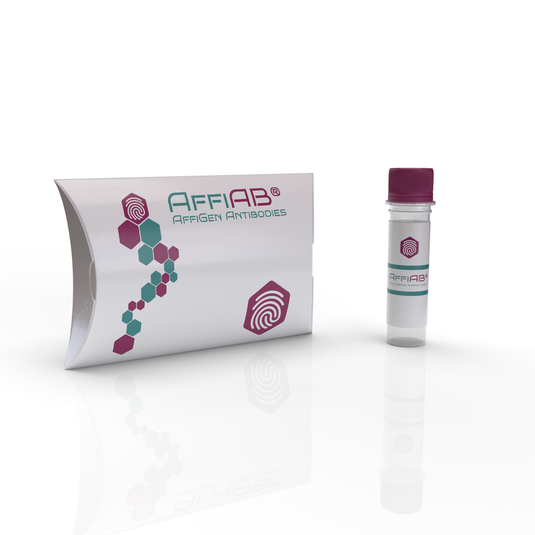AffiAB® Goat Anti-Cathepsin D Polyclonal IgG Antibody
This professional-grade Goat Anti-Cathepsin D Polyclonal IgG Antibody is ideal for your research needs. Effectively detect and identify Cathepsin D proteins with this high-quality antibody solution. Maximize your experimental results with our reliable and consistent product.
Host: Goat
Species: Human
Description:
Goat Anti-Cathepsin D Polyclonal IgG Antibody is a high-quality research-grade antibody that specifically detects the Cathepsin D protein. Cathepsin D is a lysosomal protease enzyme that is involved in the degradation of proteins in the lysosome. It is also involved in a variety of biological processes, including apoptosis, autophagy, and tumor progression. This antibody has been extensively tested and validated for use in various applications such as Western blotting, immunoprecipitation, immunohistochemistry, and ELISA. It has a high affinity and specificity for Cathepsin D and can be used for both qualitative and quantitative analysis of this protein in biological samples.
Gene Identifier/Accession Number: ENSG00000117984
Form: N/A
Concentration: 2.5 mg/mL
Type: Primary
Clonality: Polyclonal
Isotype: IgG
Conjugation: Unconjugated
Application: Western Blot, Immunofluorescence, Immunohistochemistry PARAFFIN PROTOCOL , Immunohistochemistry FROZEN, Immunoelectron Microscopy
Storage: For continuous use, store at 2-8 °C for one-two days. For extended storage, store in -20 °C freezer. Working dilution samples should be discarded if not used within 12 hours.
Special instructions: The antibody solution should be gently mixed before use.
Goat Anti-Cathepsin D Polyclonal IgG Antibody
The Goat Anti-Cathepsin D Polyclonal IgG Antibody is a potent tool in the arsenal of molecular biologists and biochemists. Cathepsin D is a well-studied lysosomal enzyme implicated in various cellular processes, including protein degradation, apoptosis, and signal transduction. This antibody's ability to specifically target Cathepsin D has profound implications in research areas ranging from oncology to neurobiology.
Understanding Goat Anti-Cathepsin D Polyclonal IgG Antibody
Production and Specificity:
Produced by immunizing goats with a synthetic peptide of the Cathepsin D protein, this polyclonal IgG antibody is capable of recognizing multiple epitopes on the enzyme. This polyclonality ensures high sensitivity and specificity, making it a valuable tool for detecting Cathepsin D in diverse experimental conditions.
Benefits of Polyclonal Antibodies:
Polyclonal antibodies are known for their robustness in detecting proteins even in complex samples. Their ability to bind to multiple epitopes can often result in stronger signals in various assay formats.
Applications in Research and Diagnostics
1. Cancer Research:
Given its role in apoptosis and cell proliferation, Cathepsin D is a significant marker in cancer studies. The Goat Anti-Cathepsin D Polyclonal IgG Antibody is used to analyze the expression levels of this enzyme in tumor tissues, aiding in the understanding of cancer progression and the development of therapeutic strategies.
2. Neurodegenerative Diseases:
In neurobiology, alterations in Cathepsin D expression and function are linked to diseases like Alzheimer's and Parkinson's. This antibody is crucial in studying these modifications, providing insights into the pathophysiology of neurodegenerative disorders.
3. Immunohistochemistry (IHC):
The antibody is extensively used in IHC to visualize the localization and expression patterns of Cathepsin D in tissue sections. This application is vital in understanding the enzyme's role in tissue-specific functions and pathologies.
4. Western Blotting:
For protein expression analysis, the Goat Anti-Cathepsin D Polyclonal IgG Antibody is a key reagent in Western blotting. It helps in quantifying Cathepsin D levels under different physiological conditions or in response to various treatments.
5. Enzyme-linked Immunosorbent Assay (ELISA):
In ELISA, this antibody enables the quantification of Cathepsin D concentrations in biological samples, crucial for diagnostic and research purposes.
Conclusion
The Goat Anti-Cathepsin D Polyclonal IgG Antibody is a pivotal tool in modern biomedical research. Its applications in cancer, neurodegenerative diseases, and basic cellular biology highlight its versatility and importance. As our understanding of Cathepsin D's role in health and disease continues to evolve, this antibody will undoubtedly remain integral to future discoveries and therapeutic innovations.

